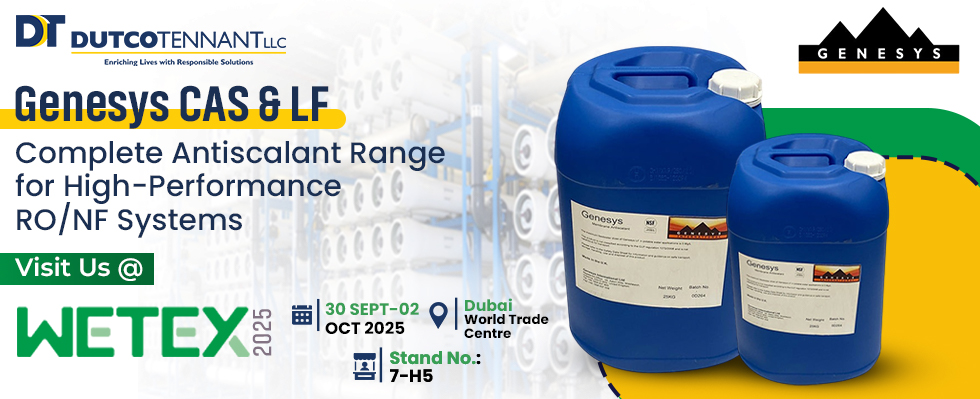
How Genesys Antiscalants Are Enhancing High-Recovery RO/NF Systems
In advanced desalination and water reuse, efficiency depends on pushing RO and NF systems to higher recovery rates. Yet scaling remains a constant barrier. From calcium sulphate crystallisation to metal-induced fouling, deposits inside membranes reduce flow, raise pressure and shorten membrane life. This is where Genesys CAS and Genesys LF from H2O Innovation (Genesys) bring targeted solutions that align with the growing demand for high-performance water treatment worldwide.
Calcium Sulphate: The Scale That Restricts Recovery
Detailed membrane studies confirm that calcium sulphate scaling can cause 10-30% decline in permeate flow while increasing pressure demands. Energy costs rise accordingly, with industry analyses showing up to 30% higher consumption and 25-40% more frequent cleanings in scaling-prone plants.
Genesys CAS directly addresses this limitation. Developed for RO and NF units with high sulphate loads, it demonstrates strong inhibition of calcium sulphate and calcium carbonate.
System Benefits of Genesys CAS:
- Keeps recovery at design levels without flux decline
- Cuts raw water intake needs and concentrate disposal
- Stabilises energy consumption by reducing scaling load
- Delays cleaning cycles, protecting membranes and lowering costs
Its effectiveness reflects published product data confirming threshold inhibition properties that outperform conventional acid dosing.
Broad-Spectrum Shield: Genesys LF for Mixed Challenges
Where scaling profiles are complex, with carbonate, silicate and metal foulants such as Fe, Mn and Al, a wider protection strategy is essential. Genesys LF, a concentrated phosphonate antiscalant validated by NSF certification, provides this flexibility.
Genesys LF Strengths:
- Broad-spectrum action across salts and foulants
- Proven stable at LSI +2.6, allowing aggressive recovery designs
- Extends membrane service life and reduces cleaning frequency
- Maintains potable water quality without reliance on acid dosing
Peer-reviewed studies and industry reports support its performance, confirming how reducing fouling lowers operational costs and minimises downtime.
Genesys CAS vs Genesys LF: Technical Overview
| Parameter | Genesys CAS | Genesys LF |
|---|---|---|
| Primary Target | Calcium sulphate scaling | Mixed scaling and fouling species |
| Additional Protection | Calcium carbonate inhibition | Sequesters Fe, Mn, Al |
| Performance Threshold | Maintains recovery rates in sulphate-rich feeds | Operates reliably at LSI +2.6 |
| Key Advantag | Reduces water intake and discharge | Extends membrane life and cleaning intervals |
| Best Application | Systems dominated by sulphate load | Systems facing diverse feedwater challenges |
Scaling Trends Shaping Global RO/NF Operations
The global RO membrane market is forecast to grow at 8-10% CAGR between 2023 and 2030, driven by water reuse and desalination demand. Today, 30-40% of advanced desalination plants operate with high-recovery RO and NF systems, confirming a shift towards designs that conserve water and reduce waste.
Against this backdrop, scaling is a primary cost driver. Without advanced antiscalants, operators face energy surges, frequent cleaning and premature membrane replacement. By combining Genesys CAS for sulphate control with Genesys LF for broader protection, plants achieve higher recovery, lower costs and stronger operational resilience.
Experience Genesys at WETEX 2025
We at Dutco Tennant are proud to bring a curated range of innovations to WETEX 2025, joining some renowned industry leaders on this international stage. Among the highlights, H2O Innovation (Genesys) will showcase Genesys CAS and Genesys LF, demonstrating how advanced antiscalants are reshaping high-recovery RO/NF performance.
Don’t miss it out, as the specialists will clearly explain operations and resolve your doubts upfront. We can also arrange for a one-on-one consultation with you.
Mark the calendar:
Dubai World Trade Centre
30 Sept to 2 Oct
Stand No.: 7-H5
